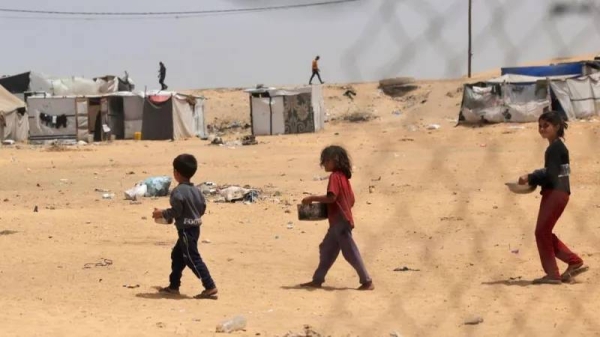Food distribution in the southern Gaza city of Rafah has come to a halt due to a lack of supplies and security concerns, as reported by the UN. The UN agency for Palestinian refugees, Unrwa, stated that their distribution center and a World Food Programme warehouse are currently inaccessible due to the ongoing Israeli military action against Hamas in eastern Rafah. More than 810,000 people out of the million who sought refuge in Rafah have fled since the Israeli operation began on May 6. Additionally, Unrwa’s health centers have not received any medical supplies in the past 10 days, further exacerbating the humanitarian crisis in the region.
As the situation in Gaza continues to deteriorate, the US has expressed concern over the lack of aid distribution in the region. Despite 569 tonnes of food and other aid entering Gaza through a newly-completed floating pier, it is believed that none of it has been distributed to Palestinians by aid organizations. In response to the growing desperation among the Palestinian population, crowds intercepted several WFP lorries transporting aid from the pier to a warehouse in Deir al-Balah, prompting the agency to suspend deliveries. The WFP has now paused distribution as the UN plans new routes to avoid overcrowding and ensure a more organized delivery process.
Amidst the chaos and violence in Gaza, reports have surfaced of Israeli forces targeting medical facilities. The head of the World Health Organization stated that the largest partially functional hospital in northern Gaza was reportedly hit four times during a recent battle between Israeli forces and Palestinian armed groups. Medics at Kamal Adwan hospital in Beit Lahia reported that the hospital’s emergency department was struck by Israeli missiles, forcing them to evacuate patients onto the streets. Additionally, al-Awda hospital in Jabalia has been under siege since Sunday, with dozens of staff, patients, and accompanying individuals trapped inside, further highlighting the urgent need for humanitarian assistance in the region.
The escalating humanitarian crisis in Gaza has put the lives of millions at risk, with access to essential services such as food, medical supplies, and shelter becoming increasingly limited. The suspension of food distribution in Rafah due to a lack of supplies and security concerns further exacerbates the challenges faced by the already vulnerable population in the region. The ongoing Israeli military action against Hamas has created a volatile environment, hindering aid organizations’ ability to reach those in need and deliver crucial assistance to the affected communities. As the conflict continues to escalate, it is crucial for the international community to step up efforts to provide humanitarian aid and support to the people of Gaza.
In response to the dire situation in Gaza, humanitarian organizations like Unrwa and the World Food Programme are working tirelessly to address the urgent needs of the population. Despite facing challenges such as insecurity and limited access to distribution centers, these organizations are committed to ensuring that aid reaches those who need it most. By coordinating with local partners and implementing new distribution routes, aid agencies are striving to overcome obstacles and deliver lifesaving assistance to the affected communities. However, the ongoing violence and blockades present formidable challenges, requiring a concerted global effort to ensure the delivery of humanitarian aid to Gaza and alleviate the suffering of its people.
The recent attacks on medical facilities in Gaza have raised concerns about the protection of essential services and the safety of healthcare workers in conflict zones. The deliberate targeting of hospitals and health centers not only violates international humanitarian law but also deprives civilians of critical medical care during times of crisis. The international community must condemn such attacks and hold those responsible accountable for their actions. By upholding the principles of humanitarian assistance and protecting medical facilities, we can ensure that vulnerable populations in conflict-affected areas receive the lifesaving support they desperately need. Through collective action and solidarity, we can help alleviate the suffering of the people of Gaza and promote peace and stability in the region.








